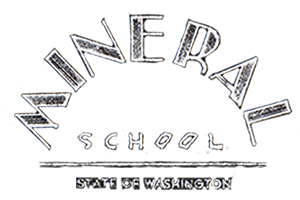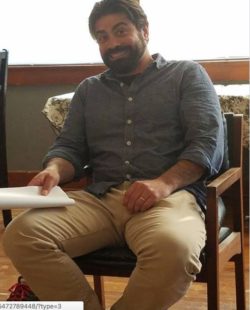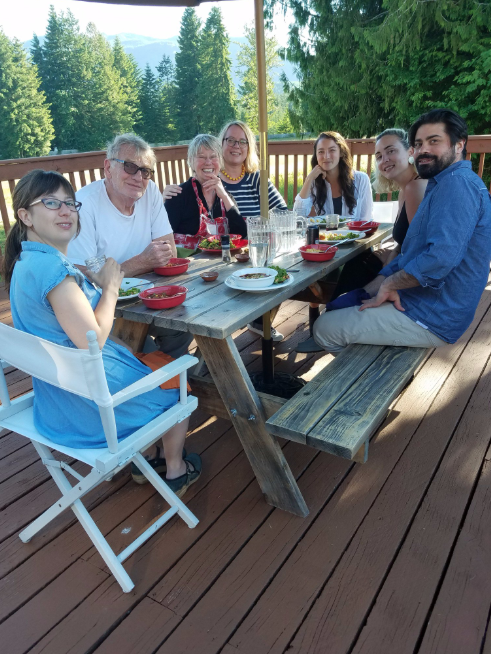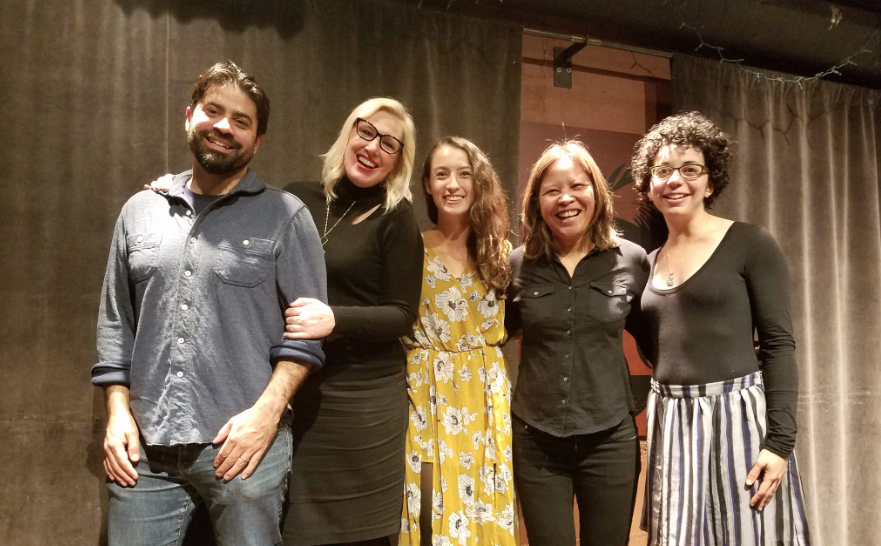Blog
Meet a Resident: Urban Waite
Urban Waite (2017), of Seattle, is a good guy who writes evil things in fiction. He was Mineral School’s first-ever Dorm Dad during summer 2018, sharing his collection of board games, good sense of humor, and with Samuel W. Gailey the stage at our visiting authors’ reading night. He is the author of The Terror of Living, The Carrion Birds, and Sometimes the Wolf. His short fiction has appeared in the Best of the West anthology, The Southern Review, AGNI, Gulf Coast, and many other journals. His fourth novel, Far Cry Absolution, published by Simon & Schuster and Ubisoft, is a novel tie-in for the bestselling, Far Cry video game series.
You’re a cheerful person who writes scary and violent tales. How do you manage to remain upbeat when your stories might bring a man down?
I think of the violence as part of the job. It’s unavoidable when you work with the subject matter I do. Specifically, characters who are mostly out of options and who are looking to escape any way they can. And like any job, if I’m creating good scenes or good movement within the plot, I’m enjoying myself because I feel like I’m doing a good job. It’s hard to feel down about the violence when you enjoy what you do (fictionally).
Suspense, thriller, mystery… all of these categories of story are sometimes cast as “genre,” suggesting they are formulaic or less artistic. What to you distinguishes “genre” from literary versions of these pieces?
I am a genre writer but the idea that genre suggests the story is formulaic or less artistic is a bullshit concept. I personally use writing tools I’ve picked up through poetry, nonfiction, screenwriting, comics, and all genres of fiction. And in all the reading I’ve done I’ve found one thing is consistently true: a good story is a good story. There are bad stories, and bad writing in all genres, but the majority of what’s out there on the shelves are good stories and good writing. The best writers in any genre or form find a way to incorporate the reader and bring them into the author’s world, and if they achieve this they have achieved success as a writer, regardless of genre.
Who are your favorite contemporary authors and past influences? What do you admire about them or what did these writers teach you?
Thinking about this question I’ve started to believe the influences I’ve followed aren’t authors but the scenes they’ve produced. I’ve tried to read the whole catalog of some authors, but the thing I always come back to is the scene which got me hooked on their stuff to begin with. Many scenes in Kazuo Ishiguro’s Never Let Me Go come to mind when I think of a character trying to understand the self. Annie Proulx is another one who I’ve enjoyed for many reasons, but specifically for environment and a feeling of place. Cormac McCarthy for plotting and movement. The nonfiction of Hemingway and of W.C. Heinz have been big influences as I look for moments nailed down in time—moments that seem to understand the page isn’t a page at all, but a transporter for the reader. (Urban is below on the right, dining with new literary influences including — left to right — Gretchen Schrafft, Dianne Nieman, Kelly Froh, Gabrielle Bates, and Emily May!)
Do you do extensive research for your novels, and, if so, where do you turn for it?
Character and the emotion of the scene carry most of what I write all the way to the end. I try to put myself in the character’s shoes and by understanding myself I then understand the character. I’m not saying any of what I write is autobiographical, but I do believe if you’re writing about human behavior it’s important to understand yourself before you can interpret the actions and reactions of others. And before I come off as some sort of megalomaniac, I should say I research sparingly at first. As most of my characters are in desperate situations I try to stay with them until the end. I want to feel desperate, too. After I have a first draft, then I research everything… because more often than not, my own world view could use some self-evaluation.
You recently wrote a novel that is a prequel to a video game. What was that process like creatively and how did the constraints of it (more or less creating a back-story) inform how you went about the work?
If given the opportunity I would write tie-in novels every day of the year. There were pluses and minuses, as there are with everything, but the fact that the world was built already, and that I was entering into it on the fifth iteration of the game definitely helped nail down some of the facts for me. In my own novels I like to concentrate on character first, then the world around them, and finally the situation the character will face. For Far Cry Absolution two of those three factors were already fleshed out for me. The game existed before I came, it will exist after. I can’t change that. In other words, I can’t move mountains within the game, but I can create characters who behave like human beings and enrich the world the video game developers have already built. In some ways, it was very freeing for me. My concentration could be razor sharp, as many of the world-building details I worry about in my own fiction had already been done for me. But in other ways, it was equally frustrating trying to navigate a world already set in motion. For this novel, as well as all my previous novels, I like to think of the process as a puzzle being fit together. I have all the pieces, but it’s the act of finding and fitting those pieces into place that gives me the most satisfaction and helps me see the full picture.
You’re a busy father of two with a wife who has a demanding career. How do you find time to write?
It’s difficult. This is going to sound like a cliché, but being a parent is the hardest job I’ve ever had. Not just because of how difficult it is to raise a human being, but how difficult it is to give up a piece of yourself to do so. In the past, I’ve found success as a writer by immersing myself in the fiction. I used to write my short stories in a day or two. I’d come up with the character, the concept, and then go. It has been the same for my novels. I wrote my first novel in a month, my second and third I wrote in two-week increments, and then my last novel I wrote almost entirely at Mineral School, working twelve to fourteen hours a day over the course of the two-week residency. There are months and months of work that go in before, and then after, but it’s important for me to get that first draft out as quickly as possible.
Having children has changed the whole process for me. My wife and I are fortunate to have varying schedules from week to week where she has the kids three to four days and then I have them three to four days. Plus I wake up at 3 am every morning to work when it’s quiet in the house. All this is just a way of saying, we make it work but it’s definitely not the immersive process I’m used to. This coming year our oldest will be in preschool five days a week and we don’t even know what that will be like. My hope for that time is that I’ll have more time to write and sit and immerse myself in the fiction.
What are you working on right now?
It almost sounds reductive to say I’m working on a bank robbery novel because there’s more to it than that. The robbery aspect of it is really just the background. It’s the icing on the cake, not the cake itself. My main character is a woman who went to prison fifteen years before, in the process giving up her newborn child for adoption. The story I’m trying to get at is a question of how she copes with this history after she has been released from prison. How has her viewpoint of the world changed? How does she look at herself now, after all these years, having missed out on the life and child she could have had.







